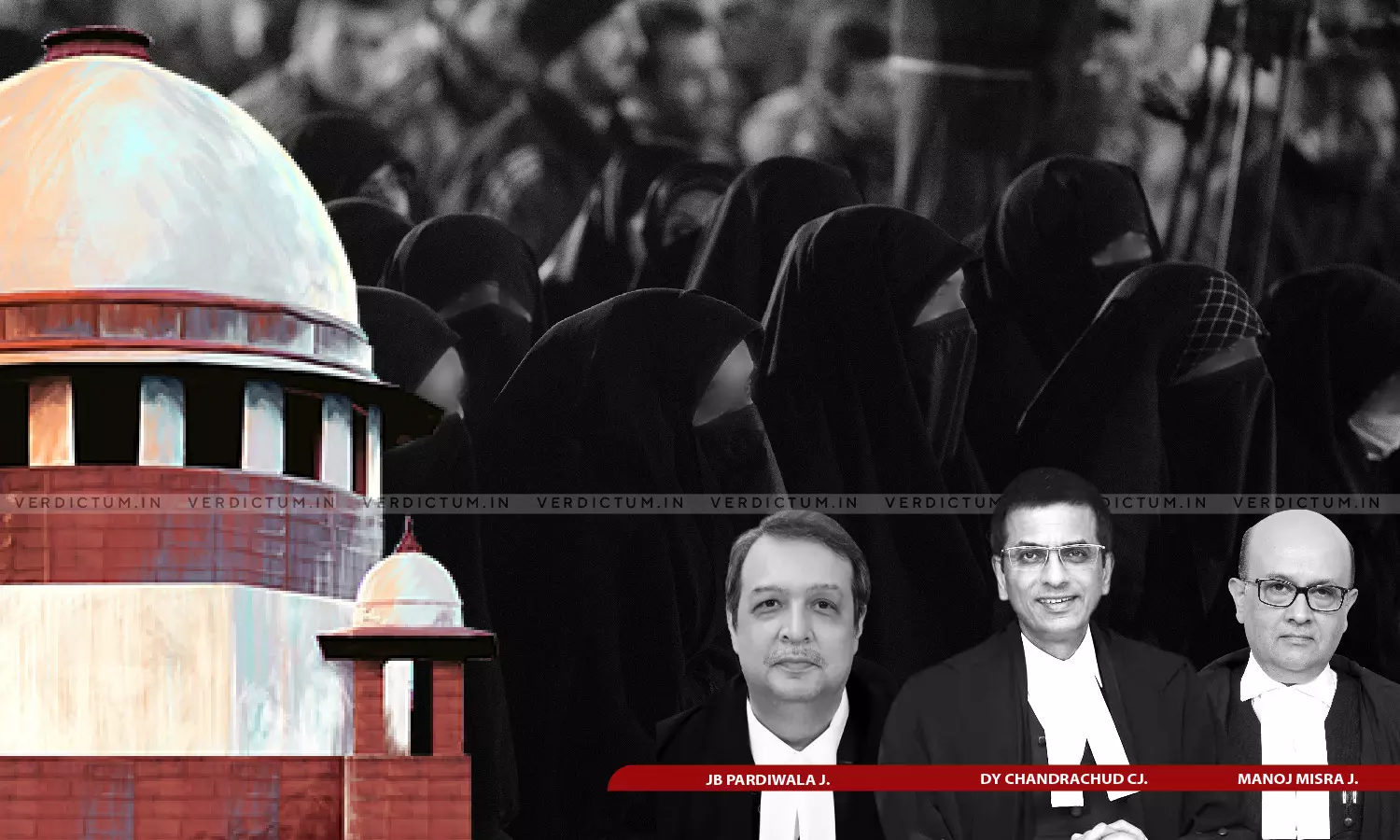
Succession Act Clearly States That It Will Not Apply To Muslims: Supreme Court Asks Centre To Respond To Plea By Non-Believer Muslim Woman Seeking Choice To Opt Out Of Sharia Law
 |
|The Supreme Court today sought the Union of India's response in a Writ Petition filed by a Kerala-based woman who was born into Islam but is now identifying as a non-believer, and contended that she should be governed by secular statutes instead of Sharia law.
While seeking the Centre's reply, the Bench of Chief Justice DY Chandrachud, Justice JB Pardiwala, and Justice Manoj Misra remarked, "The Succession Act clearly says that it will not apply to a Muslim. It is clearly in the teeth of the Act."
At the outset, Advocate Prashant Padmanabhan, appearing for Safiya, informed the Bench that the matter has come up for the first time after notice.
Additional Solicitor General (ASG) Aishwarya Bhati, appearing for the Union, submitted, "Kindly see the prayers. She is asking as a practicing Muslim who wants to be governed by the Indian Successions Act."
Bhati further contended that the issue of a Uniform Civil Code (UCC) is currently under consideration by the government, though no legislative decision has been made. “UCC is being considered by the government, my Lord. We don’t know if the legislature will consider it,” the ASG said.
The Court directed the government to file a counter-affidavit in light of the notice issued and noted that the matter would require further consideration. "This will require consideration. You file a counter, since we have issued notice," the Court said.
“We will file a counter,” ASG Bhati assured the Court.
Pertinently, on May 1, the Court had issued notice in the writ petition. The petition filed by Safiya PM aims to secure a declaration from the 'prescribed authority' under the Muslim Personal Law (Shariat) Application Act, 1937, allowing non-believers to opt out of Sharia law. The Writ Petition further sought a declaration that non-believer Muslims should be governed by the provisions of the Indian Succession Act, 1925, in matters of intestate and testamentary succession for their lineal descendants.
“Persons who do not want to be governed by the Muslim Personal Law must be allowed to be governed by the secular law of the country, viz., the Indian Succession Act, 1925, both in the case of intestate and testamentary succession,” the petition said.
The Petition highlights the broader implications of the issue and urges the Court's intervention, particularly in light of the pending case SLP (Civil) No. 9546 of 2016, which addresses succession among Muslim women. Safiya, born a Muslim woman to a non-practising Muslim father, faces challenges in protecting her civil rights. She serves as the General Secretary of Ex-Muslims of Kerala.
Under the current legal framework, individuals born as Muslims are subject to the Muslim Personal Law (Shariat) Application Act, 1937, which poses complications for those wishing to renounce their faith. Sharia law dictates that apostates forfeit inheritance rights, leading to concerns for the petitioner and her lineal descendants, particularly her daughter.
The petitioner sought a declaration that she should not be governed by Muslim Personal Law for any matters covered under the Act, advocating for the application of secular laws such as the Indian Succession Act, 1925. However, existing statutes do not provide a mechanism for obtaining such a declaration, creating a legislative gap that requires judicial interpretation to address. She argues that the absence of legal protection undermines her fundamental rights under Article 25, rendering them meaningless.
“The petitioner wishes to get a declaration that she shall not be governed by Muslim Personal Law for any of the matters listed in Sections 2 or 3 of the Muslim Personal Law [Shariat] Application Act, 1937, but there is no provision either in the Act or in the Rules wherein she can obtain such a certificate. There is a clear vacuum in the statute which can be plugged by judicial interpretation,” the plea read.
The Petitioner prayed, "This Hon’ble Court may be pleased to declare that the persons who do not want to be governed by the Muslim Personal Law (Shariat) Application Act, 1937, must be allowed to be governed by the secular law of the country, viz, the Indian Succession Act, 1925 both in the case of intestate and testamentary succession."
Cause Title: Safiya P.M. v. Union of India & Anr. (Writ Petition (Civil) No.135/2024)